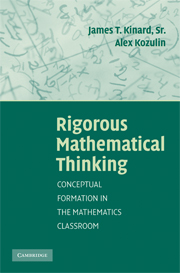Book contents
- Frontmatter
- Contents
- Introduction
- 1 Culture of Mathematics
- 2 Goals and Objectives of Mathematics Education
- 3 Vygotsky's Sociocultural Theory and Mathematics Learning
- 4 Mediated Learning and Cognitive Functions
- 5 Mathematical Concept Formation and Cognitive Tools
- 6 RMT Application, Assessment, and Evaluation
- Conclusion
- References
- Index
5 - Mathematical Concept Formation and Cognitive Tools
Published online by Cambridge University Press: 05 June 2012
- Frontmatter
- Contents
- Introduction
- 1 Culture of Mathematics
- 2 Goals and Objectives of Mathematics Education
- 3 Vygotsky's Sociocultural Theory and Mathematics Learning
- 4 Mediated Learning and Cognitive Functions
- 5 Mathematical Concept Formation and Cognitive Tools
- 6 RMT Application, Assessment, and Evaluation
- Conclusion
- References
- Index
Summary
Mathematically Specific Psychological Tools
As discussed in Chapter 4, one of the main goals of the Instrumental Enrichment (IE) program is to help learners to appropriate and internalize general psychological tools. This process of appropriation and application guides learners to systemically develop their high-level cognitive functions. However, it is only through the mathematically specific psychological tools that these cognitive functions can be organized and integrated with basic conceptual elements in such a way that they become capable of supporting mathematical generalizations and abstractions.
The prevailing culture of the current mathematics instruction presents learners with ready-made mathematical concepts using the abstract language of mathematical symbols followed by algorithmic deductive demonstrations, examples, and problems that require direct application. This paradigm is used both in the training of preservice teachers in colleges and universities and later for the students of these teachers when they start teaching in various classrooms around the United States. This entrenched model is further promoted by the textbook industry, which ascribes overwhelmingly to presenting mathematics content through the same regimen. As a result a considerable gap emerges between the paradigm of professional mathematicians and that of mathematics education. Professional mathematicians use the existent mathematical symbolic tools or generate new ones to develop, represent, manipulate, and validate mathematical ideas. In a word they are focused on the process of mathematical reasoning and the tools required by this process.
- Type
- Chapter
- Information
- Rigorous Mathematical ThinkingConceptual Formation in the Mathematics Classroom, pp. 107 - 158Publisher: Cambridge University PressPrint publication year: 2008

